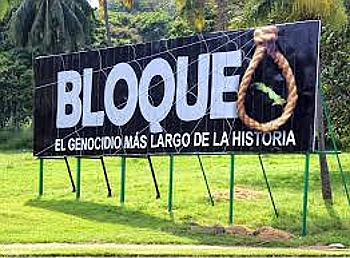THE BLOCKADE
The US blockade or ‘el bloqueo’ as it is known in Cuba – is a collection of US laws and legislation which restricts Cuba's ability to have trade and normal relations with the US, and in some cases, other countries too.
The US government first imposed economic, commercial, and financial restrictions on Cuba in October 1960 shortly after the 1959 Cuban Revolution. In February 1962 the blockade was extended to include almost all imports. Further legislation in the 1990s further strengthened and codified the blockade into US law, meaning that it can only be fully lifted by an act of Congress.
Although the economic aspect is central, the effects of the blockade are wide-reaching encompassing health, education, access to basic provisions as well as sports and culture.
Children’s hospitals face obstacles when it comes to acquiring specialist materials suitable for small children, most of which come from the US.
Though US sales of food to Cuba have been allowed since 2000, they are governed by the application of strict measures of supervision and a complicated and bureaucratic process. Cuba is forced by the blockade to spend vast sums of additional money to import food from other markets. For example, seed potatoes imported to Cuba must be imported with freight costs 50% higher than if they were bought from the US.
In 2009, Amnesty International called for the blockade against Cuba to be lifted, stating that “it is highly detrimental to Cubans' enjoyment of a range of economic, social and cultural rights, such as food, health and sanitation – particularly affecting the weakest and most vulnerable members of the population . . . (the blockade) is highly detrimental to Cubans' enjoyment of human rights”.
Cuba estimates that the cost of the blockade since its introduction is now over $753 billion*.
In October 2016, the United Nations General Assembly voted for the 25th consecutive year on a resolution calling for an end to the illegal blockade of Cuba. 191 countries - the largest amount in the vote's history - voted for an end to the blockade, and historically, zero countries voted against - just the US and Israel abstained. In October 2017, following the election of Donald Trump and his 'new' Cuba policy, the US and Israel returned to voting against Cuba's resolution; 191 countries voted in favour of ending the blockade, 2 against and zero abstentions.
Blockade not embargo
It is referred to as a blockade rather than an embargo because an embargo implies a legal, territorial arrangement which prohibits trade with a particular country. In contrast, a blockade goes beyond a legal, territorial arrangement and is applied extra-territorially – effecting Cuba’s ability to trade with other countries too.
The US 1996 Helms-Burton Act (1996) extended the blockade to apply to foreign companies trading with Cuba and penalised foreign companies allegedly ‘trafficking’ in property formerly owns by US citizens but expropriated by Cuba after the Revolution.
Helms-Burton codified the blockade as law, meaning the President could no longer terminate the policy; the power now lies with Congress.
The Protection of Trading Interests Act (1980) in the UK, makes it illegal for UK companies to comply with extra-territorial legislation, however this legislation is repeatedly ignored when it comes to Cuba. For instance, in December 2012, British bank HSBC was fined $665m for violating US sanctions against Cuba.
Why is the US blockading Cuba?
The blockade was a response to Cuba’s 1959 Revolution. During this time the properties of US citizens and corporations who were based in Cuba were expropriated and there was widespread re-nationalisation and land reform. The blockade was a reaction to these acts and aimed to eventually topple the revolutionary government.
Following statements by Cuba and the US on 17 December 2014, that the two countries would work to normalise relations, many people have incorrectly assumed that this means the blockade is over. However, despite embassies opening in Washington and Havana in summer 2015, the blockade is still very much in place.
More information
The blockade has not ended - An interview with Josefina Vidal in Granma
Read: The Economic War Against Cuba by Salim Lamrani
*According to Cuba’s 2016 report to the United Nations: "The economic damage caused to the Cuban people through application of the United States economic, commercial and financial embargo against Cuba, taking into account the depreciation of the dollar against the price of gold on the international market, amounts to US$ 753.688 billion, despite the decline in the value of gold compared to the previous period. At current prices, since the policy was introduced over 50 years ago, the embargo has inflicted quantifiable damage of more than US$ 125.873 billion."

